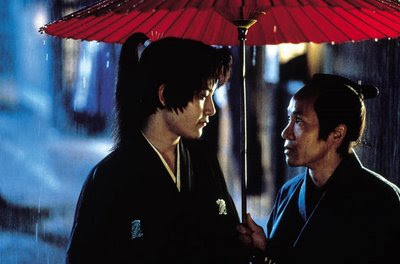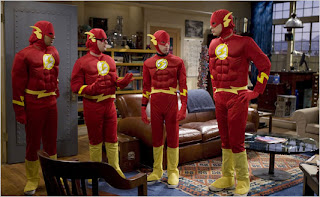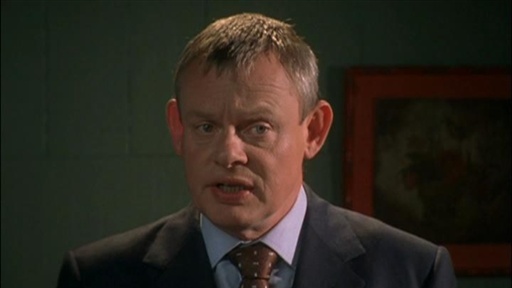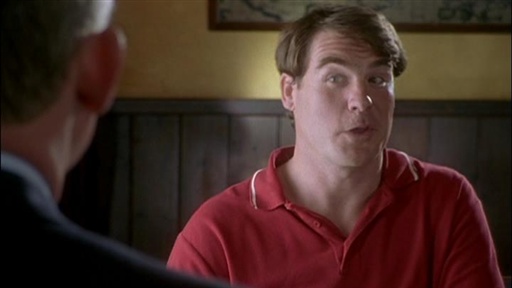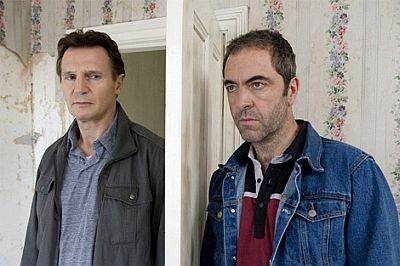The stand-up comedy and LGBT edition!
#40. Saget, Bob: That Ain't RightMy only prior experience of Bob Saget's comedy was his bit in
The Aristocrats, which I loved so much I decided to watch more. About 10 minutes into
That Ain't Right, I sincerely regretted this decision. From the outset of this piece, Saget seemed high or drunk -- and allowing for one of the two is my kind way of excusing the horrific tempo of his comedy, the absolute absence of significant beats or effective pausing. I don't know if all his comedy has the same sloppiness, but I'm fairly convinced his Full House routine, a seemingly necessary exorcism for a family-friendly TV star turned to vulgar stand-up, must make a regular appearance at his shows. So why is it so unfunny? Again, maybe it just comes down to his erratic rhythm, maybe it was just a shitty night -- but there was precision in his interpretation of
The Aristocrats, there was build-up and anticipated follow-through. In
That Ain't Right his shock-value routine isn't, and it simply doesn't work.
#41. Cook, Dane: Harmful If SwallowedDane Cook similarly took my by surprise: I had already seen
Vicious Circle, a 2005 production, and I liked the pacing, his energy when performing it, and the tight, fluid connectivity between his material.
Vicious Circle was about relationships, in all their incarnations, and his performance was dramatic but in top form.
Harmful If Swallowed was only released two years earlier: there couldn't be
that much difference between the quality of material, could there? Well, yes, there was. Again, 10 minutes of this piece was enough to finally grasp what the hell people are talking about when they referred to Dane Cook as a lousy stand-up comic. In
Harmful If Swallowed, there's no other way to describe him: His material has a feeling of spontaneity all right, and he bounces around the stage proving the excesses of energy at his disposal, but the content itself is absurd enough that we can't linger too long on it before tiring... and oh, does he ever linger too hard on it. One of the greatest responses good comedy should elicit is the side-splitting cry of "so true!" But somewhere between evoking our inner desire to be a poisonous snake, constantly being startled by stage and camera equipment, a ham-handed abuse of accents, catch-phrases, and his constant use of "gay" or "faggot" as punchline, he somehow loses it. There are some glimmers near the end of this set of the Dane Cook I saw in
Vicious Circle -- notably, a routine about saying weird things during sex that seems like a flimsy precursor to his "Taste the rainbow" bit from later in his career -- but ideally someone looking for good Dane Cook should just skip this video and focus on the 2005 work instead.
#42. Chappelle, Dave: For What It's WorthFinally, some rock-solid comedy! Dave Chappelle is just spot-on in
For What It's Worth; I watched this bit twice in two days because my housemate also wanted to see it, and the routines just improved with repeat viewings. Dave Chappelle is a master of impressions and accents, something I think isn't said enough about his work. He also has complete control when playing with race -- something he unfortunately almost has to address, while white comics can get away with never addressing it in their performances -- and what emerges is a skit that objectifies
everyone but also introduces some exceptionally subversive elements to their performance. High points therein include the classic "purple drink" routine, a pithy evisceration of contemporary differences between black and white culture through weed, and the most marvellous reversal of Aboriginal stereotyping I've seen in a comedy set in a long time. I cannot wait to watch more of his work: Chappelle's just all kinds of smart with his funny.
#43. Carlin, George: Collection (4-Discs)Another smart comic is obviously
George Carlin, who really just makes the senselessness of the world seem all right with his gentle deconstructions of absurdity. This four disc collection is an hilarious blast from the past, featuring tacky HBO intros from the 70s and George himself as a younger, slimmer, wide-eyed man in bell-bottoms, is chock-full of delightful routines geared toward the university circuit he was touring. Amid a whole slew of material you won't have seen him cover in his later career are classics like the Seven Words You Can't Say On TV, and then-contemporary classics like Carlin's special brand of news report, but the other material is all damn good, too. I've never laughed so hard about
Monopoly before, and his fascination with crowd mentalities seems both perfectly suited to his '70s audiences and timeless in his own way. For George Carlin fans, this is NOT a series to miss.
#44. Degeneres, Ellen: Here and NowOf all the comics listed here, Ellen is the only one to run a set with no vulgarity whatsoever. This is no way makes her less funny, and I have to confess to being gobsmacked by that fact. In one of the Carlin performances, he responds to the then-contemporary question of why he inserts "language" into his routines, and he explains that while he could easily perform without the occasional swear for an hour, he would be speaking in an artificial language, one removed from day-to-day reality. That may be true, but there's nothing artificial about Ellen's gentle approach to comedy. There's a great bit in the middle of this set about the weatherman -- "No wonder they snap when they start talkin' to the weatherman ... they go to some fantasy land ... 'And now it's Johnny with the weather; Johnny, when are you going to stop with the rain and bring us some sunshine.' 'I'll stop with the rain when you stop with the car-jackings, Colleen.'" In this you can see the heart of her comedy: She's just so darn sweet with her material, about the lighter side of life, but it works extraordinarily well and still manages to hint at the more sinister side of things in the process. Another thing I love about Ellen is the surety with which she tackles, at the outset of her performance, the question of sexual orientation (as with Dave Chappelle, there is an unfortunate expectation set that difference needs to be addressed): Ellen grabs hold of the matter in a way the recognizes that expectation set, and throws it the heck out in the process of addressing it. A beautiful performer, and family-friendly to boot!
#45. Bound
I'm going to go ahead and say I can't stand Jennifer Tilly's voice. I'm sure a lot of people consider it a hell of a turn-on, but it feels to me like someone in the sound studio's been screwing with the controls whenever she speaks. With that off my chest, on to the film:
Bound is a piece we're supposed to like because it's got two very hot ladies -- an ex-con (Corky, played by Gina Gershon) working as plumber in the building with her lover, a mafia man's mistress named Violet (Jennifer Tilly) -- providing a female-centred alternative within the thriller/film noir genre. And it's the Wachowskis, doing something very different at a time when stark few representational alternatives existed in mainstream cinema (in short, anyone who saw this film when it came out is likely going to be a die-hard champion of its context and importance). That's all well and fine, but god, is this piece
boring. "But! But! The
ladies!" some will protest. To which I point out that when a plumber walks into an apartment on flimsy pretenses, and gets it on with the lady therein, you've got porn,
maybe erotica, but never
intrinsically art. The narrative of this piece follows the two lovers planning to steal two million from Violet's boyfriend, Caesar, and set him up to take the blame: unfortunately, complications arise in the process and things get messy, fast. Indeed, the film picks up a little toward the end, when just such complications emerge, but it's an otherwise tedious build up. I recognize wholeheartedly that I can call it tedious
because it's been done,
because the day has come and gone when two women leading in a crime thriller would be exciting enough to preclude all real plot or character development. Nonetheless, that's where we stand: My spoiled generation needs
more from our bi/lesbian protagonists than soft, inviting lips and a gorgeous rack.
#46. Angels in America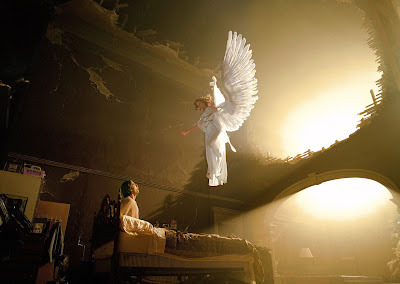
I wish I could call some angels down right now to help sing the praises of this gorgeous, nuanced piece -- more miniseries than movie, a beautiful, heart-felt screen rendering of the equally heart-stopping play by Tony Kushner. I confess to avoiding this film for years because it was first sold to me as being "about AIDS" at a time when I had seen such a glut of films about the crisis that I couldn't imagine anything new being said by anyone about the topic. So let me then not do you the disservice of saying this film is "about AIDS," in case your own cynicism is as great as mine was: Yes, there is a lawyer dying of AIDS in this piece, a horrible man based on a real-life figure whose militant McCarthyism extended during the Reagan years into lobbying against those gay rights and considerations that his own male lovers would have desperately longed for. (Al Pacino plays the part of Roy Cohn surely and hauntingly.) Yes, there is a young gay man coping with his AIDS death sentence -- but worse, the abandonment at this time of need of his lover, who has already suffered a loss at the film's outset. (Justin Kirk as Prior Walter and Ben Shenkman as Lou.) But this is truly just the surface of the piece, and as the characters of Joe Pitt -- attorney in Roy's office and closeted gay Mormon (played by Patrick Wilson) -- his wife, Harper (Mary-Louise Parker) -- hallucinating on Valium in the midst of her sexless marriage -- and Joe' mother, bearing the burden of her own unsatisfying marriage as she tries to understand her son coming out as gay (Meryl Streep) start to emerge, an immensely different kind of epic rises from this piece. It's not really until Prior Walter is haunted by his ancestors, however -- as a precursor to visitation from an angel who will command him to become a prophet (the angel another incarnation of Meryl Streep) -- that this greater thesis really takes hold. When Prior does get haunted, though, and it emerges that great diseases have devastated his family (and indeed, humankind) for generations; and when it follows that the angels in heaven haven't heard from God in a while; and when Belize, friend and nurse to Prior throughout this ordeal (Jeffrey Wright), haunts Roy on his deathbed with an assertion that heaven is the present Manhattan with people fully realized and equal in all their sexual and cultural variations -- that's when it hits. This isn't a film "about AIDS": it's a film about the breadth and absurdity of human suffering, and the moments of real humanity that can almost make it bearable. This film was an absolute treasure, and privilege, to view.
#47. Itty Bitty Titty CommitteeMy feelings about
The L Word are conflicted enough that I am both hesitant and intrigued to see what its actors have done outside the series. So of course when I heard Daniela Sea was in this piece, playing the role of Calvin, I figured I'd give this widely acclaimed LGBT release a shot. I'm glad I did:
IBTC is irreverent, funny, and not too full of itself; furthermore it pursues a refreshing narrative alternative to what one usually sees from lesbian rom-coms (no coming out angst here!) and is presented in often quite interesting stylistic/cinematic ways. The story follows aimless Anna (Melonie Diaz) shaken out of her school/work/relationship rut when she catches Sadie (Nicole Vicius) tagging the windows at her office, and thrown into a sense of purpose and community when she meets the rad-fem, punk anarchist group Clits in Action. Individual character dynamics sometimes tweaked me (there are a few points that really strain suspension of disbelief), and some of the characters are condemned by the script to one-dimensionality, but on the whole director Jamie Babbit has nonetheless established an ambitious and distinct discourse with this piece. Is it flawed? Heck yes. Is it pushing queer cinema in fun new directions? Yes yes yes.
#48. Fabulous! The Story of Queer Cinema
This 2006 documentary is immensely straightforward in concept and execution: a) list some queer cinema highlights in chronological order, and b) intersperse this chronology with interviews with actors, directors, producers, and queer commentators talking about what those films meant to them, what the queer activist context was, and what those films meant to the industry. Ladies and gentlemen, sometimes simplicity is awesome. The interviewees spoke with such awe at what had come before, and excitement for what was still to come, that you couldn't help but feel a sense of community and inclusivity in the work. Their conversations are also so varied, their insights so honest and culturally relevant, it doesn't matter that this piece is already four years behind contemporary queer cinema, or that its repertoire of cited historical films has some striking omissions: To watch this piece was still to feel a desperate urge to catch up on all the influential titles I'd missed. Do yourselves a favour and watch this piece with pen and paper handy.
#49. Je Tu Il Elle
In keeping with my own new queer film list, gleaned from watching
Fabulous!, I immediately snapped up
Je Tu Il Elle when I saw it in store. This 1976 French film by director/writer Chantal Akerman is considered experimental despite a clear, if gradual, narrative arc uniting the painstakingly compartmentalized scenes. You see this curious conflict emerge in just the first few lines of the film, which cite the colours Je paints the room she inhabits for a month after her relationship with another woman ends, despite the film itself being black-and-white. Je does a rigorous amount of nothing in that month -- painting the room twice, writing and rewriting a letter to her lover, eating sugar from a bag, undressing, sleeping with her clothes. The utter winding down of her character is then confronted by another character's equally measured unwinding, but Akerman's film space is so narrow that only one character is ever permitted to be active at a time -- so Je watches and listens as truck driver Il, giving her a ride to an unknown destination, laconically undresses his own complex sexual nature (itself revealed to him only in time on the long highway routes). One of two sex acts in the film occurs after, with Je out of sight while Il directs her in the performance of a hand job. In another scene Il shaves at leisure; Je watches impassively from a corner of the stall. Then Je arrives at Elle's apartment. Elle, we discern, is Je's ex-lover, and Elle tells her she can't stay. Much is made of a rain jacket, and then Je sends Elle to fetch her food and drink. Elle watches as she eats. Elle shakes her head slowly as Je undoes her shirt and observes the breast underneath. They participate in a ten-minute sex scene as strikingly distinct from the heterosexual performance of sex as any I have ever seen. It is the only scene in the film wherein both characters are permitted to be active at once. Je's departure the next morning brings us to the film's close. In short, this is a film about gesture, about the isolation of self within place, about intimacy. As experimental work goes, it's highly accessible. More to the point, it's beautiful -- even at its ugliest, even at its most bizarre.




